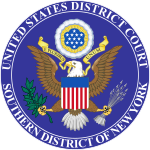The first-sale doctrine is an American legal concept that limits the rights of an intellectual property owner to control resale of products embodying its intellectual property. The doctrine enables the distribution chain of copyrighted products, library lending, giving, video rentals and secondary markets for copyrighted works. In trademark law, this same doctrine enables reselling of trademarked products after the trademark holder puts the products on the market. In the case of patented products, the doctrine allows resale of patented products without any control from the patent holder. The first sale doctrine does not apply to patented processes, which are instead governed by the patent exhaustion doctrine.
Software copyright is the application of copyright in law to machine-readable software. While many of the legal principles and policy debates concerning software copyright have close parallels in other domains of copyright law, there are a number of distinctive issues that arise with software. This article primarily focuses on topics particular to software.
SoftMan Products Co. v. Adobe Systems Inc. was a lawsuit heard in the U.S. District Court for the Central District of California in 2001 by Judge Dean D. Pregerson.
MGM Studios, Inc. v. Grokster, Ltd., 545 U.S. 913 (2005), is a United States Supreme Court decision in which the Court ruled unanimously that the defendants, peer-to-peer file sharing companies Grokster and Streamcast, could be held liable for inducing copyright infringement by users of their file sharing software. The plaintiffs were a consortium of 28 entertainment companies, led by Metro-Goldwyn-Mayer studios.

A&M Records, Inc. v. Napster, Inc., 239 F.3d 1004 was a landmark intellectual property case in which the United States Court of Appeals for the Ninth Circuit affirmed the a district court ruling that the defendant, peer-to-peer file sharing service Napster, could be held liable for contributory infringement and vicarious infringement of copyright. This was the first major case to address the application of copyright laws to peer-to-peer file sharing.

In re Aimster Copyright Litigation, 334 F.3d 643, was a case in which the United States Court of Appeals for the Seventh Circuit addressed copyright infringement claims brought against Aimster, concluding that a preliminary injunction against the file-sharing service was appropriate because the copyright owners were likely to prevail on their claims of contributory infringement, and that the services could have non-infringing users was insufficient reason to reverse the district court's decision. The appellate court also noted that the defendant could have limited the quantity of the infringements if it had eliminated an encryption system feature, and if it had monitored the use of its systems. This made it so that the defense did not fall within the safe harbor of 17 U.S.C. § 512(i). and could not be used as an excuse to not know about the infringement. In addition, the court decided that the harm done to the plaintiff was irreparable and outweighed any harm to the defendant created by the injunction.
Block Entertainment or Block Ent. Worldwide is a record label created by Russell "Block" Spencer and Andrew "Gotti" Couser. The label is known for creating southern group Boyz N Da Hood and releasing artist Yung Joc. In 2005 Block signed an exclusive joint venture deal with Warner Music Group's label Bad Boy Records. In November 2009, Block Entertainment signed a joint venture deal with Capitol Records. In 2011 the label released Gorilla Zoe's album King Kong, which features the first single "What's Going On".
Capitol Records, Inc. v. Thomas-Rasset was the first file-sharing copyright infringement lawsuit in the United States brought by major record labels to be tried before a jury. The defendant, Jammie Thomas-Rasset, was found liable to the plaintiff record company for making 24 songs available to the public for free on the Kazaa file sharing service and ordered to pay $220,000.
Sony Corp. of America v. Universal City Studios, Inc., 464 U.S. 417 (1984), also known as the "Betamax case", is a decision by the Supreme Court of the United States which ruled that the making of individual copies of complete television shows for purposes of time shifting does not constitute copyright infringement, but is fair use. The Court also ruled that the manufacturers of home video recording devices, such as Betamax or other VCRs, cannot be liable for contributory infringement. The case was a boon to the home video market, as it created a legal safe haven for the technology.

Perfect 10, Inc. v. Amazon.com, Inc., 508 F.3d 1146 was a case in the United States Court of Appeals for the Ninth Circuit involving a copyright infringement claim against Amazon.com, Inc. and Google, Inc., by the magazine publisher Perfect 10, Inc. The court held that framing and hyperlinking of original images for use in an image search engine constituted a fair use of Perfect 10's images because the use was highly transformative, and thus not an infringement of the magazine's copyright ownership of the original images.

Vernor v. Autodesk, Inc. was a case in the United States District Court for the Western District of Washington regarding the applicability of the first-sale doctrine to software sold under the terms of so-called "shrinkwrap licensing." The court held that when the transfer of software to the purchaser materially resembled a sale it was, in fact, a "sale with restrictions on use" giving rise to a right to resell the copy under the first-sale doctrine. As such, Autodesk could not pursue an action for copyright infringement against Vernor, who sought to resell used versions of its software on eBay. The decision was appealed to the United States Court of Appeals for the Ninth Circuit, which issued a decision on September 10, 2010, reversing the first-sale doctrine ruling and remanding for further proceedings on the misuse of copyright claim. The Ninth Circuit's decision asserted that its ruling was compelled by Ninth Circuit precedent, but observed that the policy considerations involved in the case might affect motion pictures and libraries as well as sales of used software.

Cartoon Network, LP v. CSC Holdings, Inc., 536 F.3d 121, was a United States Court of Appeals for the Second Circuit decision regarding copyright infringement in the context of DVR systems operated by cable television service providers. It is notable for partially overturning the Ninth Circuit precedent MAI Systems Corp. v. Peak Computer, Inc., regarding whether a momentary data stream is a "copy" per copyright law.
A&M Records, Inc. v. Napster, Inc., 114 F.Supp.2d 896 (2000), was the district court case which preceded the landmark intellectual property case of A&M Records, Inc. v. Napster, Inc., 239 F.3d 1004 (2001). The case was heard by Judge Marilyn Hall Patel of the United States District Court for the Northern District of California. Napster appealed this case to United States Court of Appeals for the Ninth Circuit.
Omega S. A. v. Costco Wholesale Corp., 541 F.3d 982, was a case decided by the Ninth Circuit Court of Appeals that held that in copyright law, the first-sale doctrine does not act as a defense to claims of infringing distribution and importation for unauthorized sale of authentic, imported watches that bore a design registered in the Copyright Office. It is contrasted with Kirtsaeng v. John Wiley & Sons, Inc.

Arista Records LLC v. Lime Group LLC, 715 F. Supp. 2d 481, is a United States district court case in which the Southern District of New York held that Lime Group LLC, the defendant, induced copyright infringement with its peer-to-peer file sharing software, LimeWire. The court issued a permanent injunction to shut it down. The lawsuit is a part of a larger campaign against piracy by the Recording Industry Association of America (RIAA).

Capitol Records, Inc. v. MP3tunes, LLC is a 2011 case from the United States District Court for the Southern District of New York concerning copyright infringement and the Digital Millennium Copyright Act (DMCA). In the case, EMI Music Group and fourteen other record companies claimed copyright infringement against MP3tunes, which provides online music storage lockers, and MP3tunes's founder, Michael Robertson. In a decision that has ramifications for the future of online locker services, the court held that MP3tunes qualifies for safe harbor protection under the DMCA. However, the court found MP3tunes to still be liable for contributory copyright infringement in this case due to its failure to remove infringing songs after receiving takedown notices. The court also held that Robertson is liable for songs he personally copied from unauthorized websites.
ReDigi was an online marketplace for used digital music, eBooks, games, apps, and software. It claims to be the only cloud storage service that verifies whether each digital file uploaded for storage was legally acquired from an eligible source. ReDigi's Cloud and Marketplace only accept lawfully purchased digital media. The service allowed users to buy and sell pre-owned digital content directly from one user to another. As of December 2020, the website is offline.
Fox Broadcasting Co. v. Dish Network, LLC is a copyright case in which the United States District Court for the Central District of California, by granting partial summary judgment, denied most parts of the copyright claims presented by Fox Broadcasting Company (Fox) against Dish Network (Dish) for its service, a DVR-like device that allowed users to record programming that could be accessed later through any Internet-connected device. The service offered by Dish also allowed users to record any or all Fox's prime-time programs and to automatically skips commercials (AutoHop).
Impression Products, Inc. v. Lexmark International, Inc., 581 U.S. ___ (2017), is a decision of the Supreme Court of the United States on the exhaustion doctrine in patent law in which the Court held that after the sale of a patented item, the patent holder cannot sue for patent infringement relating to further use of that item, even when in violation of a contract with a customer or imported from outside the United States. The case concerned a patent infringement lawsuit brought by Lexmark against Impression Products, Inc., which bought used ink cartridges, refilled them, replaced a microchip on the cartridge to circumvent a digital rights management scheme, and then resold them. Lexmark argued that as they own several patents related to the ink cartridges, Impression Products was violating their patent rights. The U.S. Supreme Court, reversing a 2016 decision of the Federal Circuit, held that the exhaustion doctrine prevented Lexmark's patent infringement lawsuit, although Lexmark could enforce restrictions on use or resale of its contracts with direct purchasers under regular contract law. Besides printer and ink manufacturers, the decision of the case could affect the markets of high tech consumer goods and prescription drugs.

RealNetworks, Inc. v. Streambox, Inc., 2000 WL 127311, was a copyright law case of the United States District Court for the Western District of Washington, over the anti-circumvention provisions of the Digital Millennium Copyright Act and whether those provisions are violated by a service that enables Internet users to circumvent the copyright protection controls used by a streaming platform.







